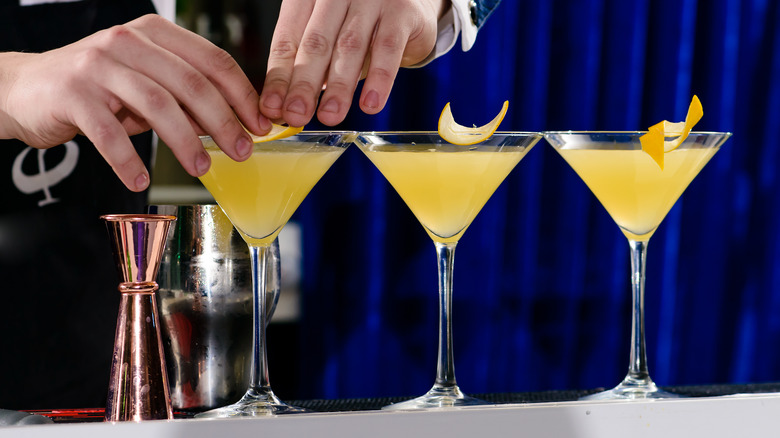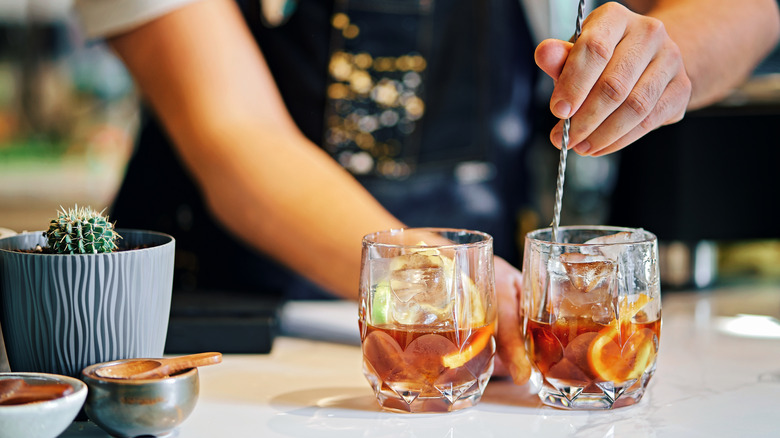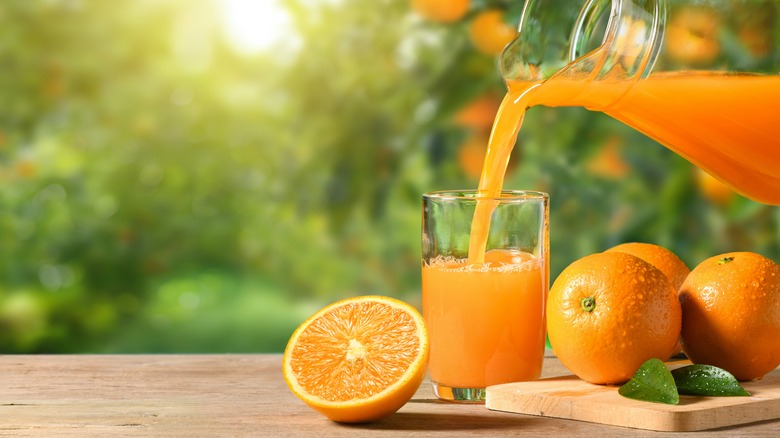Batching Your Cocktails Will Help You Be The Host With The Most At Your Next Party
We may receive a commission on purchases made from links.
Batching cocktails and mixed drinks does for party hosts what batch cooking does for busy home gourmands who want to eat from-scratch meals despite their schedules. It preps goodies up — party libations, in this case — ahead of the party. The advantage? When the guests arrive, all the host needs to do is open the fridge, pull out the glass drink pitcher, maybe add a few ice cubes to a glass, and pour. No complicated, on-the-spot mixology involved. The party gets underway faster and the host has less work on the day of the party.
Still, some drink recipes work better for cocktail batching than others. Generally speaking, stirred drink recipes – martinis and old-fashioneds, for example — make better candidates for this trick than other types of drinks will. (Yes, that means even your favorite frozen margarita recipes need to sit this one out.) Basically, if the mixed drink contains a mix of bitters, sugar, and spirits, it's probably a good bet for batching.
Mixing up the batch
However, you'll still need to develop a protocol for making cocktails in the convenient economy size. Finding a way to scale up your recipe easily and accurately is job one. The simplest method asks you to exchange ounces to cups. For example, if a single drink recipe requires an ounce of vodka and you want to make eight drinks, then you'll need 1 cup of vodka in the batch because 8-ounces equals 1 cup. You'll scale up each ingredient in the drink this way.
Once you have the basic boozy ingredients for the batched cocktails in the pitcher, add water. Follow this rule of thumb: Add 20% water in proportion to the booze if you won't serve the drinks immediately. Go with 15% water if you're breaking out the booze right away. When it comes time to add the ice, you'll need one cup of ice for every 10 drinks or so.
Mix the drinks up in a pitcher or a Mason jar with a lid. This allows you to store the drink mix in the fridge in the same container you mixed it in. This not only saves you labor because you're not dirtying up extra pitchers, it also provides a shield against the smells that sometimes seep into the drink mix from the fridge. Think martinis that taste like last-night's lasagna, and you're getting what's being implied here.
Other tips for batching
The principles of batching aren't limited to simple stirred drinks. For example, a French 75 consists of gin, lemon juice, simple syrup, and Champagne. The fruit juice and the Champagne are bad candidates for a pre-batch. The flavor of juice in cocktails goes downhill in a pre-batch situation. The fizz in your Champagne will fizzle out in a hot New York minute if you add it to the pitcher and put it into the refrigerator overnight, or even for a couple of hours. No more crisp and bubbly Champagne for you.
Logic says to strike this drink off your batching chores. However, you don't need to — at least, not completely. In this case, batch the gin and the simple syrup ahead of time. On the day of the party, add a proportionate amount of Champagne and lemon juice to the pitcher to complete the drink.
On a related and final note, if you're in doubt about which ingredients should go into a pitcher of cocktails, stick with the bitters-sugar-booze formula. Ingredients like juices and drinks with bubbles are too fragile to remain stable in the fridge once they're mixed into the drink mix. Aside from this, it doesn't take long to add these types of ingredients to a batched base, but it does take a while (and cost a great deal of money) to have to remake a batch of cocktails because the ingredients went all wonky in the fridge overnight.


